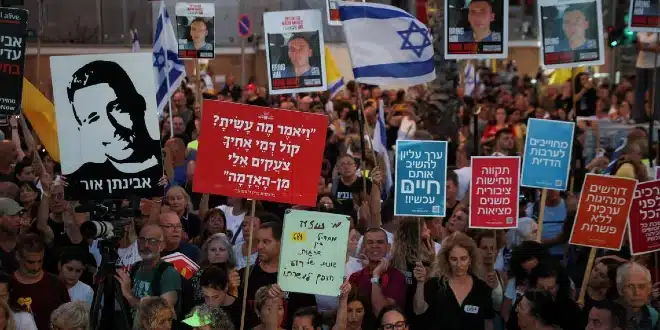Protests demanding an end to the Gaza war and the release of hostages erupted across Israel on Tuesday, hours before the country’s security cabinet was set to convene for a high-level meeting. Demonstrators blocked major roads in Tel Aviv, waving Israeli flags and displaying photos of those still held captive in Gaza. Other rallies were reported near the U.S. embassy branch in the city and outside the homes of government ministers nationwide.
Ruby Chen, whose son was abducted by Hamas in October 2023, spoke at one gathering, accusing Prime Minister Benjamin Netanyahu of prioritizing the military campaign over the safe return of the hostages. “He believes it is acceptable to sacrifice 50 hostages for political needs,” Chen said.
Security cabinet officials have not released the agenda of Tuesday evening’s meeting, though local media reported it may include discussions on reviving ceasefire talks and negotiating a potential hostage deal. Earlier this month, the cabinet approved a plan for Israeli forces to seize control of Gaza City, sparking fears for the captives’ safety and triggering fresh waves of nationwide demonstrations.
Netanyahu has insisted that Israel will pursue both aims simultaneously: pushing ahead with a military offensive to capture Gaza’s largest city while also opening talks on securing the release of those still in captivity. The renewed diplomatic push came after Hamas said it had agreed to a ceasefire framework brokered by mediators, which would involve the phased release of hostages over 60 days in exchange for Palestinian prisoners.
Mounting pressure at home and abroad
The conflict continues to draw intense scrutiny both within Israel and internationally. Calls for an immediate ceasefire have grown louder as the humanitarian crisis in Gaza deepens. On Monday, Israeli airstrikes on a hospital in Gaza killed at least 20 people, among them five journalists working for outlets including Al Jazeera, Reuters, and the Associated Press.
The attack sparked outrage worldwide, with the United Nations, aid groups, and foreign governments—including Israel’s closest allies—expressing shock and concern. Netanyahu later described the incident as a “tragic mishap,” while the Israeli military announced an initial inquiry into the strike.
Journalists have faced extraordinary dangers during the war. Media watchdogs say close to 200 reporters and media workers have been killed since the conflict erupted, making it one of the deadliest wars for the press in recent history.
Origins and toll of the conflict
The war began after Hamas launched a surprise attack on Israel in October 2023, killing 1,219 people, most of them civilians, according to Israeli figures compiled by AFP. Militants also abducted 251 people during the assault. Of those, 49 remain in Gaza, including 27 that Israel’s military has declared dead. Palestinian fighters are also holding the remains of a soldier killed in the 2014 war.
In response, Israel has carried out an extensive offensive in Gaza that has left at least 62,744 Palestinians dead, most of them civilians, according to health officials in the Hamas-run territory. The United Nations has said those casualty figures are considered credible.
With hostages still in danger, tens of thousands of protesters filling the streets, and mounting international criticism, the Israeli government faces one of its most difficult balancing acts yet—pressing its military objectives while confronting the growing demand for a negotiated end to the war.


